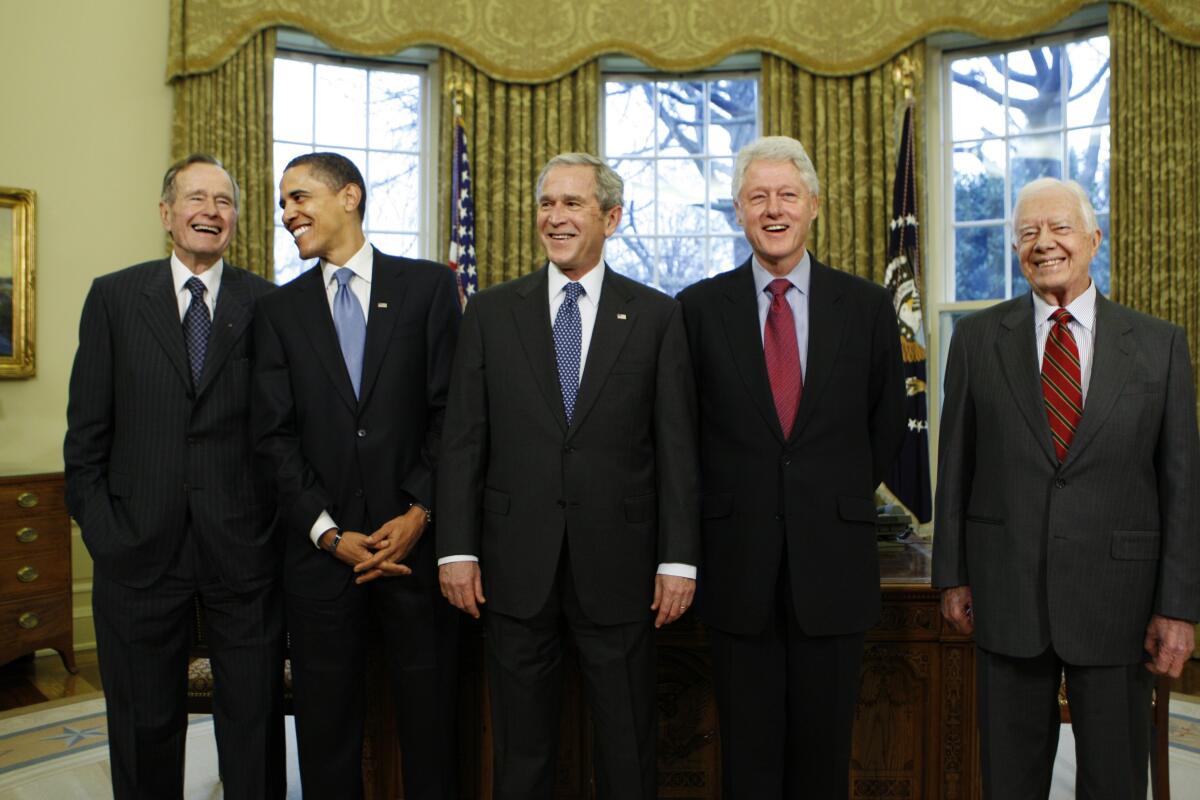The American presidency faces a triple threat. Can it survive?

- Share via
On Inauguration Day two years ago, U.S. Youth Poet Laureate Amanda Gorman confidently declared that “while democracy can be periodically delayed, it can never be permanently defeated.” On Presidents Day 25 months later, her assertion — and the state of American democracy and the presidency — merit reflection.
How have challenges to presidential leadership in recent years — from electoral-college controversies to the COVID-19 pandemic to the Jan. 6, 2021, assault on the U.S. Capitol — affected the legitimacy of the presidency and the American political system?
The electoral-college controversies were fueled by the presidential elections of 2000 and 2016, which chipped away at Americans’ confidence in the electoral system and the candidates it elevates. This was always a risk of the U.S. political system. In 1788, Alexander Hamilton advocated a strong presidency, asserting in Federalist Paper No. 70 that “Energy in the Executive is a leading character in the definition of good government.” He went on to say that checks on executive power would come from “a due dependence on the people” and “a due responsibility.” So what would happen if executives no longer depended on the people or felt “due responsibility”? In the 21st century, we may find out.
Through elections every four years, the public is supposed to decide who will hold the presidency, albeit indirectly through the unique U.S. institution of the electoral college. Until the 2000 presidential election, the electoral college typically was presented in classes as a relic in American politics that had created a few controversies in 19th century presidential elections, when the victorious electoral-college candidate did not win the popular vote. Then in 2000, the winning candidate lost the popular vote by about 500,000 ballots and won 271 electoral college votes, just over the 270-vote threshold, and in 2016, the winning candidate had a solid electoral-college victory of 304 votes, but lost the popular vote by almost 3 million ballots. It should come as no surprise that by 2022, a Pew survey found that more than 60% of U.S. adults support changing the presidential selection process.
Another challenge to democratic legitimacy in recent years is the divisive debate over presidential leadership in response to the COVID-19 pandemic. When the pandemic started in 2020, the executive branch was faulted for its limited response, and the loudest demand was for more coherent federal policy on testing, travel restrictions, masks and social distancing, among other highly contentious topics. With a new presidency in 2021, criticisms largely centered on perceived presidential overreach in imposing pandemic-response requirements, particularly with a vaccine mandate or testing/masking requirements for large companies. (The Supreme Court blocked enforcement in 2022.)
Now the partisan political divide between elected officials over executive power and the national government’s responsibilities hinders policy making, all the more so when control of Congress is divided and one or both chambers are at odds with the White House. As a result, public dissatisfaction with governmental action, or inaction, continues.
The most devastating recent challenge to democratic legitimacy in American politics is the shocking assault on the U.S. Capitol on Jan. 6, 2021, by more than 2,000 rioters seeking to overturn the results of the 2020 presidential election and stop Congress from certifying the electoral college vote. Lawmakers had to evacuate to secure locations as rioters smashed windows, stormed the Capitol, and entered congressional chambers.
Two years later, more than 950 individuals have been arrested, and approximately 400 have been found guilty at trial or sentenced via adjudication for criminal activity. In December 2022, the House Select Committee to Investigate the January 6th Attack on the United States Capitol released an 800-page report detailing what happened that day as well as efforts in multiple states to change electoral college results, with support from the outgoing administration. Accountability at the highest levels is now needed to protect the enduring U.S. practice of a peaceful transfer of power in the White House.
On Presidents Day, these challenges to democratic legitimacy in the United States make for sobering reflections on American politics and the office of the presidency. The American people are long overdue for a national conversation about whether an 18th century political system protects our rights, is sufficiently responsive to popular participation and works effectively to advance national public interests in the 21st century. Only by engaging such issues and considering institutional changes to strengthen democratic norms — the “guardrails of democracy” — can the American public ensure that democracy will not be defeated.
Meena Bose is the executive dean of the Peter S. Kalikow School of Government, Public Policy and International Affairs at Hofstra University in New York.
More to Read
A cure for the common opinion
Get thought-provoking perspectives with our weekly newsletter.
You may occasionally receive promotional content from the Los Angeles Times.






